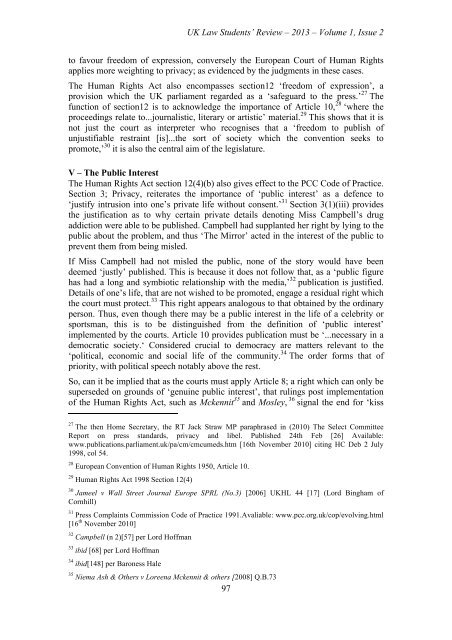Open UKLSR Volume 1(2) - Uklsa
Open UKLSR Volume 1(2) - Uklsa
Open UKLSR Volume 1(2) - Uklsa
Create successful ePaper yourself
Turn your PDF publications into a flip-book with our unique Google optimized e-Paper software.
UK Law Students’ Review – 2013 – <strong>Volume</strong> 1, Issue 2<br />
to favour freedom of expression, conversely the European Court of Human Rights<br />
applies more weighting to privacy; as evidenced by the judgments in these cases.<br />
The Human Rights Act also encompasses section12 ‘freedom of expression’, a<br />
provision which the UK parliament regarded as a ‘safeguard to the press.’ 27 The<br />
function of section12 is to acknowledge the importance of Article 10, 28 ‘where the<br />
proceedings relate to...journalistic, literary or artistic’ material. 29 This shows that it is<br />
not just the court as interpreter who recognises that a ‘freedom to publish of<br />
unjustifiable restraint [is]...the sort of society which the convention seeks to<br />
promote,’ 30 it is also the central aim of the legislature.<br />
V – The Public Interest<br />
The Human Rights Act section 12(4)(b) also gives effect to the PCC Code of Practice.<br />
Section 3; Privacy, reiterates the importance of ‘public interest’ as a defence to<br />
‘justify intrusion into one’s private life without consent.’ 31 Section 3(1)(iii) provides<br />
the justification as to why certain private details denoting Miss Campbell’s drug<br />
addiction were able to be published. Campbell had supplanted her right by lying to the<br />
public about the problem, and thus ‘The Mirror’ acted in the interest of the public to<br />
prevent them from being misled.<br />
If Miss Campbell had not misled the public, none of the story would have been<br />
deemed ‘justly’ published. This is because it does not follow that, as a ‘public figure<br />
has had a long and symbiotic relationship with the media,’ 32 publication is justified.<br />
Details of one’s life, that are not wished to be promoted, engage a residual right which<br />
the court must protect. 33 This right appears analogous to that obtained by the ordinary<br />
person. Thus, even though there may be a public interest in the life of a celebrity or<br />
sportsman, this is to be distinguished from the definition of ‘public interest’<br />
implemented by the courts. Article 10 provides publication must be ‘...necessary in a<br />
democratic society.‘ Considered crucial to democracy are matters relevant to the<br />
‘political, economic and social life of the community. 34 The order forms that of<br />
priority, with political speech notably above the rest.<br />
So, can it be implied that as the courts must apply Article 8; a right which can only be<br />
superseded on grounds of ‘genuine public interest’, that rulings post implementation<br />
of the Human Rights Act, such as Mckennit 35 and Mosley, 36 signal the end for ‘kiss<br />
27 The then Home Secretary, the RT Jack Straw MP paraphrased in (2010) The Select Committee<br />
Report on press standards, privacy and libel. Published 24th Feb [26] Available:<br />
www.publications.parliament.uk/pa/cm/cmcumeds.htm [16th November 2010] citing HC Deb 2 July<br />
1998, col 54.<br />
28 European Convention of Human Rights 1950, Article 10.<br />
29 Human Rights Act 1998 Section 12(4)<br />
30 Jameel v Wall Street Journal Europe SPRL (No.3) [2006] UKHL 44 [17] (Lord Bingham of<br />
Cornhill)<br />
31 Press Complaints Commission Code of Practice 1991.Avaliable: www.pcc.org.uk/cop/evolving.html<br />
[16 th November 2010]<br />
32 Campbell (n 2)[57] per Lord Hoffman<br />
33 ibid [68] per Lord Hoffman<br />
34 ibid[148] per Baroness Hale<br />
35 Niema Ash & Others v Loreena Mckennit & others [2008] Q.B.73<br />
97


